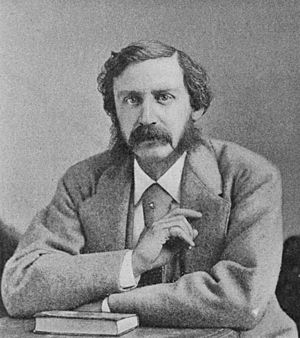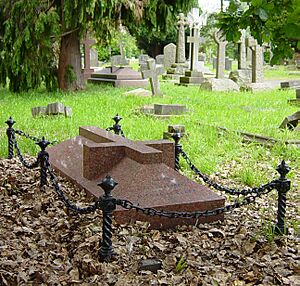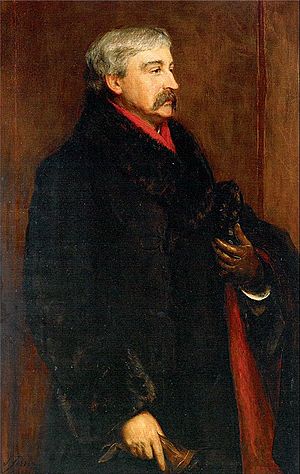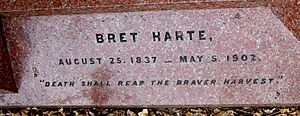Bret Harte facts for kids
Quick facts for kids
Bret Harte
|
|
|---|---|

Bret Harte in 1872
|
|
| Born | Francis Brett Hart August 25, 1836 Albany, New York, U.S. |
| Died | May 5, 1902 (aged 65) Camberley, England, UK |
| Occupation | Author |
| Genre | Fiction, poetry |
| Spouse | Anna Griswold (m. ca. 1862–1902; his death) |
| Children |
|
| Signature | |
Bret Harte (born Francis Brett Hart; August 25, 1836 – May 5, 1902) was an American short story writer and poet. He is famous for his short stories about miners, gamblers, and other interesting people from the California Gold Rush.
During his career, which lasted over 40 years, he wrote poems, plays, and stories. He also wrote book reviews and articles for magazines. As he moved from California to the eastern U.S. and then to Europe, he wrote about new topics and characters. But his Gold Rush stories are still the most popular and well-known.
Contents
Biography
Growing Up
Bret Harte was born in 1836 in Albany, New York. His birth name was Francis Brett Hart. His father, Henry, later changed the family name from Hart to Harte. When Francis grew up, he preferred to be called Bret Harte.
He loved reading as a boy. He even wrote his first poem, "Autumn Musings," when he was just 11 years old. Sadly, this poem is now lost. His family made fun of his poem, which made him feel bad. He later said he wondered if he would ever write another poem after that. He stopped formal schooling when he was 13, in 1849.
Life in California
Harte moved to California in 1853. There, he worked many different jobs. He was a miner, a teacher, a messenger, and a journalist. He lived for a while in a town called Union (now Arcata, California). This town was a supply center for mining camps.
He also worked for Wells Fargo & Co. Express. He guarded valuable treasure boxes on stagecoaches. After a few months, he became a schoolmaster near Sonora, California. He used his memories of an old stagecoach driver to create his famous character, Yuba Bill.
Harte's first poem was published in The Golden Era in 1857. In 1860, he became the editor of The Golden Era. He tried to make it a more serious literary magazine. Mark Twain said that Harte brought a "new and fresh" style to the magazine. Harte also wrote funny stories that made fun of other writers. One of these was The Stolen Cigar-Case, which featured a detective named "Hemlock Jones."
In 1860, Harte reported on a terrible event. Many Wiyot Native Americans were killed in a village near Eureka, California. Harte was the assistant editor of the Northern Californian newspaper. When his boss was away, Harte published an article about the event. Because of this, his life was threatened, and he had to leave town. He moved to San Francisco.
Harte married Anna Griswold in 1862. In 1863, his first short story was published in The Atlantic Monthly. In 1864, he helped start a new literary magazine called The Californian. He also became friends with and helped the poet Ina Coolbrith.
In 1865, Harte edited a book of California poetry called Outcroppings. He used the book's introduction to criticize California's literature. He said the state's "monotonous climate" caused bad poetry. Many people in the West were upset by his comments.
In 1868, Harte became editor of The Overland Monthly, another new literary magazine. His short story "The Luck of Roaring Camp" appeared in the magazine's second issue. This story made him famous across the country.
When Charles Dickens died in 1870, Harte wrote a poem called "Dickens in Camp" to honor him. This poem was published in the Overland Monthly.
Harte's fame grew even more with his poem "Plain Language from Truthful James" in 1870. It became known as "The Heathen Chinee". This poem was meant to criticize anti-Chinese feelings in California. However, many people misunderstood the poem. They took it literally, which upset Harte.
Leaving the West
In 1871, Harte moved back East with his family to New York and then Boston. He signed a contract with The Atlantic Monthly for $10,000 a year. This was a very large amount of money at the time. However, his popularity soon faded. By the end of 1872, he no longer had a publishing contract. He struggled to publish new work and gave lectures about the gold rush.
In 1878, Harte became a United States Consul in Krefeld, Germany. Later, in 1880, he got a similar job in Glasgow. In 1885, he settled in London. He regularly wrote to his wife and children and sent them money. However, he never invited them to join him in Europe, nor did he return to the United States to visit them. He often said it was because of money. He continued writing many stories during his 24 years in Europe.
Bret Harte died in Camberley, England, in 1902 from throat cancer. He is buried in Frimley. His wife, Anna, died in 1920. They were married for 40 years but lived together for only 16 of those years.
Selected Works

- Outcroppings (1865), editor
- Condensed Novels and Other Papers (1867)
- Tennessee's Partner (short story; 1869)
- The Luck of Roaring Camp, and Other Sketches (1870)
- "Plain Language from Truthful James", also known as "The Heathen Chinee" (1870)
- Poems (1871)
- The Tales of the Argonauts (1875)
- Gabriel Conroy (1876)
- Two Men of Sandy Bar (1876)
- Drift from Two Shores (1878)
- An Heiress of Red Dog, and Other Tales (1879)
- Flip and Found at Blazing Star (1882)
- By Shore and Sedge (1885)
- A Millionaire of Rough-And-Ready and Devil's Ford (1887)
- The Crusade of the Excelsior (1887)
- The Argonauts of North Liberty (1888)
- Cressy (1889)
- A First Family of Tasajara (1892)
- Colonel Starbottle's Client, and some other people (1892)
- A Protégée of Jack Hamlin's; and Other Stories (1894)
- Barker's Luck etc. (1896)
- Under the Red-Woods (1901)
- Her Letter, His Answer, and Her Last Letter (1905)
Stories on Screen and Stage
Many of Bret Harte's stories have been made into movies and plays.
- Several movies have been made from "The Outcasts of Poker Flat". These include films from 1937 and 1952.
- The movie Tennessee's Partner (1955) was based on his story of the same name.
- The Soviet movie Armed and Dangerous (1977) is based on his novel Gabriel Conroy.
- Operas have also been created from "The Outcasts of Poker Flat."
- The actor Craig Hill played Bret Harte in a TV show called Death Valley Days in 1956.
Legacy
Many places and things are named after Bret Harte to remember him.
- There is a Bret Harte Memorial in San Francisco.
- Bret Harte, California, is a town in Stanislaus County.
- Twain Harte, California, is a town named after both Bret Harte and Mark Twain.
- The Mark Twain Bret Harte Historic Trail is also named after both writers.
- There are many schools named after him, including:
- Bret Harte High School in Angels Camp, California
- Bret Harte Elementary School in Chicago, Illinois
- Bret Harte Middle School in San Jose, California
- Bret Harte Middle School in Oakland, California
- In 1987, Bret Harte appeared on a $5 U.S. Postage stamp.
Images for kids
-
Portrait of Bret Harte by Napoleon Sarony (c. 1870). This picture is kept at the National Portrait Gallery (United States).
See also
 In Spanish: Bret Harte para niños
In Spanish: Bret Harte para niños
 | DeHart Hubbard |
 | Wilma Rudolph |
 | Jesse Owens |
 | Jackie Joyner-Kersee |
 | Major Taylor |




